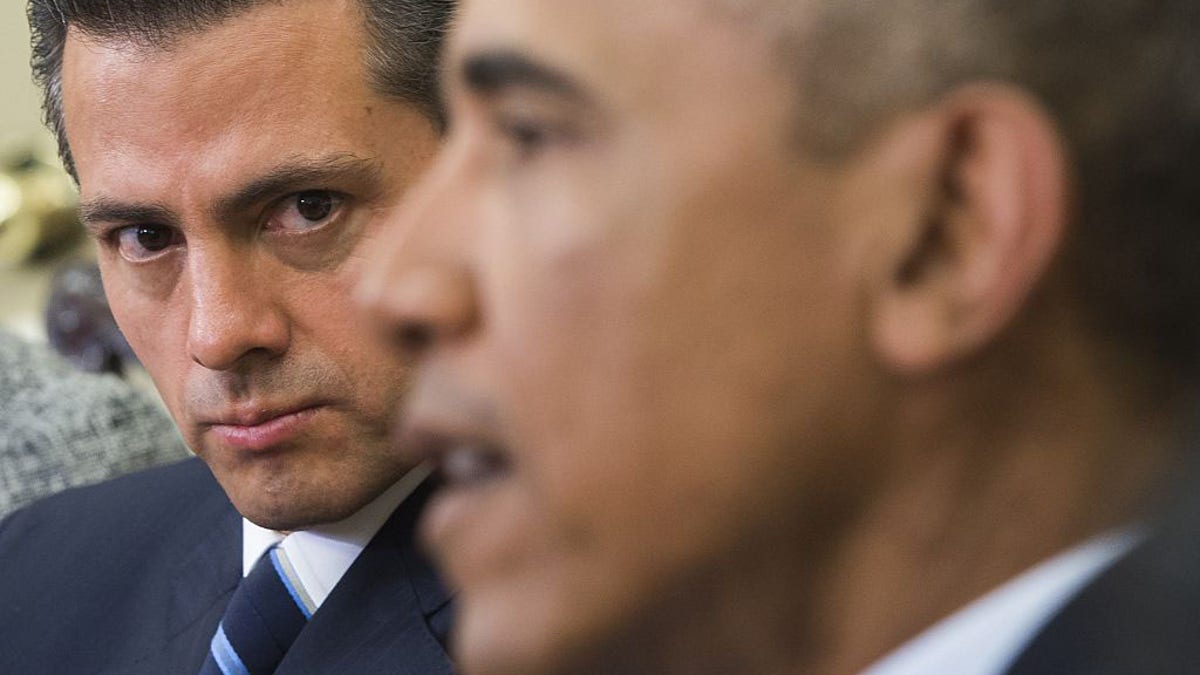
US President Barack Obama meets with Mexican President Enrique Pena Nieto in the Oval Office of the White House in Washington, DC, January 6, 2015. AFP PHOTO / SAUL LOEB (Photo credit should read SAUL LOEB/AFP/Getty Images)
Mexico City – Donald Trump hasn't even clinched the presidential nomination yet, but he's already shaping U.S. and even Mexican foreign policy.
Fueled by the Republican front-runner's comments about migration and the southern neighbor, the governments of the United States and especially Mexico have, in recent months, stepped up their efforts to improve their relationship.
President Obama has more than once dismissed the candidate’s calls for a border wall, sometimes mockingly and other times visibly concerned.
During a visit to Mexico for economic talks earlier this year, Vice President Joe Biden described Trump’s rhetoric “dangerous, damaging and incredibly ill-advised.”
"I almost feel obliged to apologize for some of what my political colleagues said," Biden said alongside Mexican President Enrique Peña Nieto. "It's a heated campaign season and I just want you to know, Mr. President, that the most heated rhetoric you've heard from competitors for the nomination for president is not who we are as the American people."
Meanwhile, high-profile visits of Mexican officials to Washington D.C. have been more frequent in recent months, in what appears to be a charm offensive.
Foreign secretary Claudia Ruiz Massieu recently replaced Mexico's ambassador to the U.S. with the highly skilled and experienced Carlos Sada, formerly consul in Los Angeles, and named a young career diplomat, Paulo Carreño King, as the new sub-secretary for North American affairs.
“Trump has brought the U.S. and the Mexican government together,” Genaro Lozano, a Reforma newspaper contributor, told Fox News Latino. In his view, the heated presidential race may have pushed Mexico into re-thinking the way it deals with its northern neighbor.
“Under the current administration of President Enrique Peña Nieto, there wasn't a real policy toward the United States. The relationship was stuck and the attitude was mostly one of reaction,” he said. “But I think nominating a new ambassador and sub-secretary for North American affairs is a strategic move.”
Trump launched his bid for the presidency last year with a controversial speech, in which he said some of the Mexican immigrants were “rapists” and “murderers.” He presented what is arguably still his most polemic proposal: to build a massive wall along the U.S-Mexican border that Mexico would pay for.
The real estate mogul has appeared to tone down his rhetoric at times, as his scuffle for the GOP nomination has pushed him to present a more presidential persona and discourse.
The border wall proposal still stands, however. Earlier this month, Trump said he would cut off the flow of billions of dollars in remittances Mexican immigrants send to their families if Mexico refuses to pay for the wall's construction, a move that could potentially ruin the Mexican economy.
But Mexicans have been fierce in their rejection of the border wall. Two former presidents, Felipe Calderón and Vicente Fox, have both said publicly they would not pay a cent for its construction, with Fox even using an expletive on live television to emphasize his anger.
U.S. officials also joined the fray. Early this month, Obama mocked Trump's border wall, wishing the billionaire “good luck with that” and calling some of his proposals “whacky.”
Mexican government officials initially kept mostly silent over Trump's comments and proposals, but come early this year began to react, often in angry rebuttal.
Last month, Peña Nieto said Trump's comments “damage the relationship” between both countries, while Finance Secretary Luis Videgaray adamantly echoed the ex-presidents' opinion that Mexico would not pay for a border wall under any circumstance. The harshest words were uttered by Foreign Secretary Ruiz Massieu, however, who has called Trump's policy proposals “racist” and “ignorant” and his border wall proposal “absurd.”
“Mexico's government was very late to react to Trump's discourse,” said Jesús Esquivel, a correspondent for Proceso magazine in Washington D.C. “It wasn't until Trump's cascade of criticism of Mexico that the foreign secretary went to Washington to ask how likely it was that Trump would become the candidate.”
Esquivel said the ramifications of Trump's candidacy have mostly spurred Mexico into revisiting its relationship with the U.S. “Mexico isn't a priority for the United States,” he said, pointing out it took nine months to confirm the U.S. ambassador to Mexico, Roberta Jacobson.
“If Obama had a real interest in Mexico, he would have nominated someone who would have gotten the necessary votes,” Esquivel said.
On the other hand, by appointing Sada as new ambassador in Washington Mexico took action in a matter that had been concerning some for months — critics describe the outgoing Basáñez as a “weak” ambassador who proved unfit for the crucial post in Washington.
“Basáñez simply didn't work out as ambassador,” said Genaro Lozano, the Reforma columnist. “He was very much second-class. His successor Carlos Sada is a far more effective diplomat. He comes from the consulate in Los Angeles, which competes with the embassy in diplomatic importance.”
Lozano said Mexico, which traditionally stays on the sidelines where relationship with the U.S. is concerned, is preparing to launch a PR campaign this summer.
“The foreign relations secretariat now seems to want to launch a publicity campaign this summer, focusing on how beneficial the bilateral relationship is to both countries and how much 25 million Mexican-Americans have contributed to U.S. society,” he told FNL.
“It would be a campaign that would influence the way people think, and I believe that's the way Mexico's government should go. It should not feel as a direct response to Trump.”
